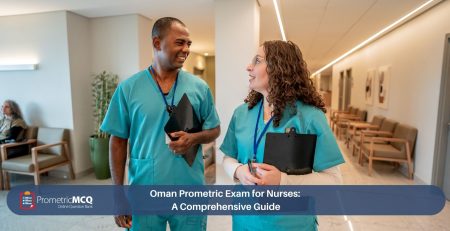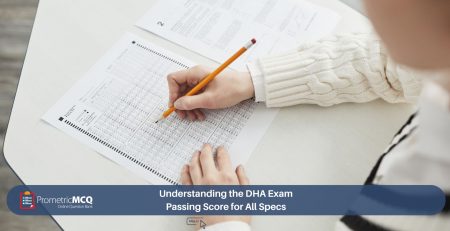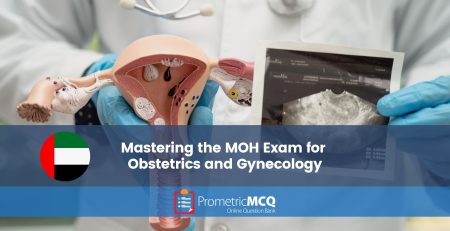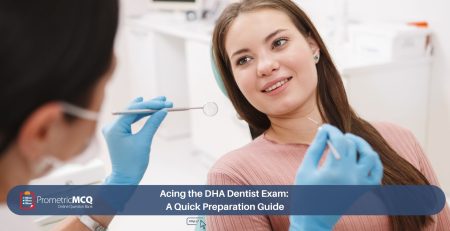
Key Differences Between DHA and MOH Exams for Nurses
fatima@prometricmcq.com2025-09-15T14:31:55+00:00Table of Contents
ToggleKey Differences Between DHA and MOH Exams for Nurses (2025)
For nurses worldwide, the United Arab Emirates stands out as a beacon of professional growth, offering access to cutting-edge medical technology, diverse patient populations, and an exceptional standard of living. As you embark on your journey to practice in this dynamic country, you will encounter a critical decision point: which licensing exam should you take? The two most prominent paths for nurses are the Dubai Health Authority (DHA) exam and the Ministry of Health and Prevention (MOHAP) exam.
On the surface, these exams appear similar. Both are computer-based tests administered by Prometric, both are designed to ensure patient safety, and both are gateways to a rewarding career. However, beneath this surface lie crucial differences in jurisdiction, content focus, and long-term career implications. Choosing the right exam is not just about passing a test; it’s about aligning your qualifications with your career aspirations in the UAE. Misunderstanding these differences can lead to wasted time, money, and effort.
This ultimate guide will provide a definitive, in-depth comparison of the DHA and MOH exams for nurses. We will dissect the nuances of their syllabi, analyze their administrative processes, and explore the distinct career pathways each license unlocks. By the end of this article, you will have the clarity and strategic insight needed to confidently choose the right exam, prepare effectively, and take the first successful step towards your nursing career in the UAE.
Key Takeaways: DHA vs. MOH for Nurses
- Jurisdiction is the Biggest Difference: A DHA license is for Dubai only. A MOH license is for the Northern Emirates (Sharjah, Ajman, etc.).
- Clinical Core is 90% Similar: The vast majority of clinical topics (Med-Surg, Fundamentals, Pharmacology) are identical, based on international nursing standards.
- Subtle Content Nuances: The DHA exam may have a slight focus on high-acuity, specialized care, while the MOH exam may lean more towards primary and community health scenarios.
- License Transfer is Possible but Requires Process: You can transfer a license between authorities, but it involves specific steps and fees. Our guide on transferring a DHA license to MOH explains this process.
- Your Career Goal Dictates the Choice: If you are targeting a specific hospital in Dubai, the DHA exam is your only option. For broader opportunities in the Northern Emirates, choose the MOH.
High-Level Overview: Understanding the Health Authorities
Before comparing the exams, it’s essential to understand the organizations behind them and the territories they govern.
Dubai Health Authority (DHA)
The DHA is the regulatory body governing all healthcare services within the Emirate of Dubai. Dubai is a global hub known for its futuristic skyline, bustling economy, and a healthcare sector that heavily emphasizes medical tourism and specialized, high-tech medical care. The city is home to numerous large, internationally accredited private hospitals (like JCI-accredited facilities) and specialized centers. The DHA exam, therefore, ensures that nurses are competent to practice in this demanding, fast-paced, and high-acuity environment.
Ministry of Health and Prevention (MOHAP)
MOHAP, often called the MOH, is the federal health authority. Its licensing jurisdiction covers the five Northern Emirates: Sharjah, Ajman, Umm Al-Quwain, Ras Al-Khaimah, and Fujairah. This region has a diverse and rapidly growing population with a mix of government-funded and private healthcare facilities. The MOHAP’s mandate is broader, with a strong focus on public health, primary healthcare, and providing comprehensive medical services to the wider community. The MOH exam reflects this by testing a nurse’s ability to work across a wider range of healthcare settings.
The Exams Deconstructed: A Side-by-Side Comparison
While many preparation resources treat the exams as identical, the subtle differences are what can make or break your performance. A good starting point for either exam is our guide to the Prometric exam for nurses.
| Feature | DHA Nursing Exam | MOH Nursing Exam |
|---|---|---|
| Jurisdiction | Emirate of Dubai only. | Sharjah, Ajman, UAQ, RAK, Fujairah. |
| Number of Questions | Typically 150 MCQs. | Typically 150 MCQs. |
| Time Limit | 165 minutes. | 165 minutes. |
| Passing Score (Estimated) | Around 60%. | Around 60%. |
| Content Focus | Subtle emphasis on high-acuity, complex patient care, specialized post-operative management, and advanced technology settings. | Subtle emphasis on primary healthcare, community nursing, public health, and management of common chronic diseases across a broad population. |
| Regulatory Component | Questions related to DHA-specific patient rights, code of conduct, and reporting structures. | Questions related to federal healthcare laws, MOHAP-specific patient charters, and public health regulations. |
Deep Dive into Content and Syllabus Nuances
This is the most critical area for candidates. While the core nursing knowledge required is the same, the *context* in which it is tested can differ.
The 90% Overlap: Core Clinical Knowledge
Both exams are built on the foundation of safe, competent nursing practice according to international standards. You must have a rock-solid understanding of these universal domains:
- Fundamentals of Nursing: The nursing process (ADPIE), vital signs, fluid and electrolytes, IV therapy, documentation, ethics.
- Medical-Surgical Nursing: Management of cardiovascular, respiratory, endocrine, neurological, and GI disorders. This forms the bulk of both exams.
- Pharmacology: Dosage calculations (oral, IV, drip rates), the “10 Rights,” major drug classes, and recognizing adverse effects.
- Patient Safety: Infection control (all precaution types), fall prevention, medication error prevention, and safe patient handling. This is the single most important theme in both exams.
- Prioritization & Delegation: Scenario-based questions on which patient to assess first and which tasks to delegate to assistive personnel.
The 10% Difference: Context and Focus
The difference isn’t in the disease; it’s in the setting. A question about managing a post-operative cardiac patient might appear on both exams. The DHA version might place the patient in a specialized cardiac ICU with advanced monitoring, while the MOH version might place them in a general surgical ward, focusing more on discharge planning and community resources.
For a detailed breakdown of the DHA exam, our guide on DHA Prometric practice tests for nurses is an invaluable resource. Similarly, for the MOH, our guide on how to prepare for the MOH nursing exam provides targeted insights.
Administrative and Career Path Differences
The choice of exam has long-term consequences for your career trajectory in the UAE.
Job Market and Opportunities
- DHA (Dubai): A DHA license gives you access to the hyper-competitive but opportunity-rich Dubai job market. This includes world-renowned hospitals like those in Dubai Healthcare City, large private hospital groups, and specialized outpatient clinics. If your dream is to work in a specific, highly specialized unit in a Dubai-based hospital, the DHA exam is your only route.
- MOH (Northern Emirates): An MOH license opens doors to a wider geographical area with a diverse range of employers. This includes large government hospitals in Sharjah, private medical centers in Ras Al-Khaimah, and community clinics across all five emirates. The cost of living is generally lower in the Northern Emirates, which can be a significant factor for many professionals.
Frequently Asked Questions (FAQs): DHA vs. MOH for Nurses
This is the most common question, and the answer is: neither. Both are challenging exams designed to test for competence. Difficulty is subjective. A nurse with a strong background in a high-tech ICU might find the DHA’s complex scenarios more familiar, while a nurse with community health experience might feel more comfortable with the MOH’s focus. The best approach is to prepare for a difficult exam, regardless of which one you choose.
No. To work within the Emirate of Dubai, you must have an active DHA license. If you hold an MOH license, you would need to go through the license transfer process to convert it to a DHA license before you can be hired by a Dubai-based facility.
The process is generally straightforward for candidates in good standing. It involves creating an account on the new authority’s portal, paying a fee, and submitting your existing license and DataFlow report. The new authority will review your file, and you will typically be exempt from retaking the exam. However, you may need to provide additional documents or a Certificate of Good Standing.
The clinical preparation is similar for all three. If you have no preference, the MOH license can be slightly more flexible as it covers a larger number of emirates. However, the most important factor is securing your first job. It is often easier to transfer a license once you are already employed and residing in the UAE.
The core process of Primary Source Verification (PSV) via DataFlow is identical. They will verify your education, nursing license, and employment history directly from the source. The required documents are the same. The only difference is which authority you designate as the recipient of the final report.
Yes, absolutely. Both exams are benchmarked against the highest international standards of care. Guidelines and best practices from global health organizations like the World Health Organization (WHO) on topics like infection control and patient safety are fundamental to the content of both exams.
Once you pass either exam, you receive an eligibility letter which is typically valid for one year. Within this timeframe, you must complete the PSV process and secure a job offer to activate your license.
Yes, and this is a highly effective strategy. Since over 90% of the clinical content overlaps, you can follow a unified study plan. Use a comprehensive QBank that covers all core nursing topics. In the final 1-2 weeks before your scheduled exam, focus specifically on mock tests and regulatory questions for that particular authority (DHA or MOH).
Salaries in the UAE are determined more by the employer (e.g., prestigious private hospital vs. government clinic), your years of experience, and your specialty, rather than the license itself. While Dubai has a reputation for high salaries, the cost of living is also significantly higher. The net income potential can be comparable in many cases.
The best way to prepare is with a versatile and comprehensive question bank. Investing in a resource that covers the full spectrum of nursing topics tested by all UAE authorities is the most efficient use of your study time. You can find tailored packages that cater to all needs at PrometricMCQ Packages.
Conclusion: A Strategic Choice for Your Nursing Future
The choice between the DHA and MOH nursing exam is a strategic one, deeply tied to your personal and professional aspirations. There is no universally “better” option—only the option that is better for you. The DHA offers a path to a fast-paced, specialized career in the global metropolis of Dubai, while the MOH provides a broader range of opportunities across the culturally rich and diverse Northern Emirates. The good news for nurses is that the core preparation is fundamentally the same. By focusing on mastering the international standards of nursing care, patient safety, and critical thinking, you will be well-equipped to conquer either exam and launch a successful and fulfilling career in the UAE.
Ready to Pass Your UAE Nursing Exam?
Our comprehensive Nursing QBank is designed to master the core clinical knowledge required for BOTH exams. With thousands of high-yield questions, detailed rationales, and simulated tests, you can prepare with confidence for any UAE nursing license.










